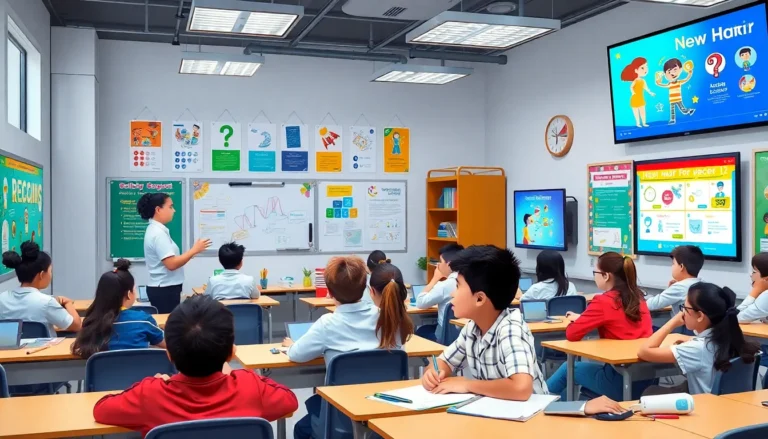Table of Contents
ToggleToday’s news from the Department of Education might just be the plot twist you didn’t see coming. Picture this: a whirlwind of policies, announcements, and maybe even a surprise dance-off—who says government can’t have a sense of humor? As the education landscape shifts, it’s crucial to stay in the loop on what’s happening, especially if you’re a student, parent, or educator.
Overview Of The Department Of Education
The Department of Education oversees federal education policies and programs in the United States. Established in 1979, this agency plays a vital role in ensuring access to quality education for all students. It works closely with state and local governments, providing funding and guidance for educational initiatives.
Their mission focuses on promoting student achievement and preparation for global competitiveness. Key responsibilities include administering federal funding for education, collecting data on student performance, and enforcing educational laws such as Title IX.
The department manages various programs aimed at improving education, including initiatives for higher education, special education, and vocational training. They also offer resources like grants and loans to support students pursuing higher education.
Today, the department remains active in addressing pressing issues such as educational equity, digital learning, and mental health in schools. With evolving policies, it responds to the needs of educators and students alike. Recent announcements from the department reflect ongoing commitment to educational excellence and innovation in learning environments.
Understanding the department’s function and recent updates is crucial for stakeholders, including parents, teachers, and students. They can stay informed about changes that affect educational opportunities and resources. Insight into the department’s objectives encourages engagement with current educational practices and policies.
Major Updates
The Department of Education announced significant changes today affecting education policy and funding. Stakeholders must stay informed about these updates.
Policy Changes
New policies emphasize educational equity and digital learning initiatives. Schools must now implement updated curricula to meet these goals. Under the recent guidelines, educators receive additional training to support diverse student needs. Increased focus on mental health resources also aims to enhance student support systems. Adjustments in accountability measures will affect how schools report student performance. Stakeholders should assess how these changes impact local education systems.
Funding Adjustments
Funding allocations saw modifications designed to support under-resourced schools and programs. The department directed an extra $500 million toward funding initiatives for mental health services in schools. Increased federal grants will assist schools in integrating technology into classrooms. Additional resources are earmarked for vocational training programs, helping students prepare for the workforce. Understanding these budget changes aids stakeholders in navigating new financial landscapes in education.
Reactions From Stakeholders
Recent changes by the Department of Education have sparked responses from various stakeholders. Educators and parents are expressing their perspectives regarding the announced policies and funding adjustments.
Educators’ Perspectives
Support for the new focus on educational equity resonates among educators. This emphasis encourages schools to design curricula that cater to diverse student needs. Many teachers appreciate the additional training aimed at enhancing pedagogical approaches. Educators believe this training will better equip them to address the varying challenges in classrooms. However, concerns also arise regarding the implementation timeline. Teachers want clarity on how soon these initiatives will be rolled out and supported with resources.
Parents’ Concerns
Parents are voicing their concerns about the implications of the recent policy changes. Access to quality education remains a priority for families across the country. Many parents worry about potential disparities in how resources are allocated to under-resourced schools. There’s skepticism regarding whether increased funding for mental health services will reach students in need effectively. Communication from the Department of Education is essential, as parents look for reassurances about their children’s educational environments. Balancing the focus on digital learning with traditional teaching methods is another issue that parents want addressed.
Implications For Students
Recent changes by the Department of Education impact students directly, shaping their educational experiences. Enhanced funding for mental health services, amounting to $500 million, aims to provide vital support systems for students facing challenges. Schools must adapt to new policies promoting educational equity, ensuring all learners receive fair access to resources.
Increased federal grants for technology integration seek to modernize classrooms and facilitate digital learning opportunities. Vocational training programs receive more attention, equipping students with crucial skills for the workforce. These initiatives emphasize hands-on experience, making students more competitive in job markets.
Accountability measures undergo revisions, influencing how schools report student performance. Schools now face new standards that require transparency and effectiveness in meeting diverse student needs. Educators receive additional training to better support a broad range of learning styles.
Parents express a mix of hope and concern regarding these developments. While many welcome the focus on mental health and resources, questions about implementation timelines arise. Parents look for clarity on how these changes will affect their children’s daily experiences in schools.
Support for under-resourced schools stands central to these updates, but disparities may still exist in resource allocation. Communities remain vigilant in monitoring how funds get distributed, advocating for equity among all educational institutions. Active engagement with the Department of Education can provide reassurance and insights into these evolving policies.
Today’s developments from the Department of Education mark a significant shift in how educational policies will shape the future for students and educators alike. With an emphasis on equity and mental health resources, these changes aim to create a more supportive environment in schools.
Stakeholders are encouraged to stay engaged as these policies unfold. Their involvement is crucial in ensuring that the needs of all students are met and that resources are allocated effectively. As the educational landscape evolves, understanding these updates will empower communities to advocate for the best possible outcomes for their children.







